
Larbalestier, Justine. 2009. (October Release). Liar. Bloomsbury. 388 pages.
I was born with a light covering of fur. After three days it had all fallen off, but the damage was done. My mother stopped trusting my father because it was a family condition he had not told her about. One of many omissions and lies. My father is a liar and so am I. But I'm going to stop. I have to stop. I will tell you my story and I will tell it straight. No lies, no omissions. That's my promise. This time I truly mean it.
Is Micah Wilkins, our narrator, a compulsive liar? Is she trustworthy? Is she sane? Divided into three parts, (Telling the Truth, Telling the True Truth, and The Actual Real Truth) Justine Larbalestier offers readers an always compelling, somewhat-unbelievable, but oh-so-thrilling read. When we first meet Micah, she's just learned something horrible: her boyfriend, Zach, is dead. Murdered. Everyone is stunned including Sarah, Zach's actual girlfriend, and Tayshawn, Zach's best friend. Who is Micah? Where does she fit in? Everywhere and Nowhere. As his after-hours girl--well, lover--she doesn't run in the same circles as Zach. She's little better than a freak at school. A girl with extremely short hair who doesn't wear makeup, who doesn't look or act like the other girls. A girl who once for a few days convinced everyone that she was a boy.
It's true that Micah feels out of sorts and all in-between. Not white enough to be white. Not black enough to be black. Not feminine enough to fit in with the popular girls, the gossipy girls. She doesn't feel pretty, that's for sure.
She is good at many things: lying, for one, biology, for another, and last but certainly not least, running. She is faster than fast. At least that is what she tells us. Why doesn't she have friends? Is it her appearance? The fact that she likes attention and tells outrageous lies?
What's her secret? Does that secret involve murder? What's the real story? Can we ever know the truth?
I liked this one mostly. It was definitely intense and suspenseful. It definitely made me think. It's a complex book, which is always nice to see. But I'm not sure I liked it, liked it. I'm not sure I want to hang out with Micah any time soon. I don't think we're meant to.
This is one of those books that could be easily spoiled for readers by too much description. So I'm purposefully keeping it short. The more I describe my thoughts (and reactions) about Micah, the more preconceived ideas and notions you might have to carry with you if you decide to pick it up on your own.
I am not quite sure I get the cover though. I'm not saying the US cover isn't attractive enough in its own little way. But it doesn't take the reader very long to discover that the main character, Micah, is black with very short, very cropped hair. True, the narrator is a compulsive liar, so maybe readers should doubt her when she says that she is black with short, cropped hair and can sometimes pass as a boy. But if this girl on the cover is meant to be Micah, well, there's nothing freaky or awkward about her. And even if you don't consider all that, I'm not sure that this cover matches the mood of the book. Do those eyes and that hair say it's a dark-mysterious-thriller?
The Australian cover.
© Becky Laney of Becky's Book Reviews
Viewing: Blog Posts Tagged with: glaciers, Most Recent at Top [Help]
Results 1 - 15 of 15
Blog: Becky's Book Reviews (Login to Add to MyJacketFlap)
JacketFlap tags: YA Fiction, paranormal, unreliable narrators, YA Mystery, "L" Authors, YA Thriller, "L" Titles, 2009, Add a tag
Blog: Becky's Book Reviews (Login to Add to MyJacketFlap)
JacketFlap tags: YA Historical Fiction, YA Romance, "L" Authors, "K" Titles, 2009, Penguin USA, Add a tag

Libby, Alisa. M. 2009. (March 2009) THE KING'S ROSE. Dutton. 296.
The King's Rose is one of those books that just captured my attention (and my heart!). It is a fictionalized account of Catherine Howard, and for those not in the know, she was the fifth wife of Henry VIII. Catherine Howard was just fifteen (perhaps even fourteen) when she caught the lusty eyes of the King. (And Henry liked them young.) Catherine's tale is tragic in that while the king chose her...she quite honestly didn't have a choice in the matter. Prompted and urged by her family--she became the person they created her to be, that the king wanted or needed her to be. And thus her life of deception began. For Catherine has a secret or two that may be her undoing...
The king is in love with me. But who am I? Who is this girl that the Howards created out of their words, to whom the king has given his love? I am King Henry's sweet wife--Catherine Howard, no more. I wonder if God can see me now, see the treason in my heart. I squeeze my eyes shut, pushing these thoughts from my mind. I am a player upon a stage, even when the stage is a bed, even in an intimate moment such as this, with no costume or mask to cover my nakedness, I must play my part well, especially in an intimate moment such as this. I must become my role, and nothing else. (56)She's haunted by a kiss shared with her distant cousin, one of the King's men, Thomas Culpepper, a perfect kiss with much promise...because it occurred before she caught the King's attention.
My life will be more than I ever could have imagined--but perhaps it will also be a little bit less. All of this must be put aside now, the words and dreams that led to his perfect kiss, near midnight in the dark garden at Westminster, and all the happiness that kiss seemed sure to promise. This was a different Catherine who received these letters, who responded to that kiss--since then I have been transformed by the king's eyes, by the royal jewels around my neck and a cloth-of-gold gown...but who is the real Catherine: the shadow or the light? The smoke or the flame? (44)The King's Rose is engaging and richly detailed. Libby is an excellent storyteller. It's just not the story itself that is fascinating, but how the story is told that makes it so captivating.
Other reviews: Peeking Between Pages, YA or STFU, Just One More Page, The Book Bag. Stop, Drop, and Read.
Author's official site, official blog.
© Becky Laney of Becky's Book Reviews
Blog: Becky's Book Reviews (Login to Add to MyJacketFlap)
JacketFlap tags: picture books, 2008, "L" Authors, blog tours, "U" Titles, Add a tag

Lundebrek, Amy. 2008. Under the Night Sky. Illustrated by Anna Rich. Tilbury House Publishers.
Under the Night Sky is a picture book story of a single working mom and her son taking time to be spontaneous and enjoy the wonder and spectacular beauty of the natural world around them. In this case, it is the northern lights--the aurora borealis--that they are enjoying together side by side. It is moments like these that make special memories, a life worth living. The illustrations by Anna Rich are nice. I love the colors and tones. They complement the text well. As to the text, I enjoyed it as well. The story was a good one--a mother and son seeing each other and the world in a new way, sharing these unplanned moments together.
© Becky Laney of Becky's Book Reviews
Blog: Becky's Book Reviews (Login to Add to MyJacketFlap)
JacketFlap tags: friendship, school, YA Fiction, 2008, YA Romance, YA realistic fiction, "L" Authors, "D" Titles, Add a tag

Lockhart, E. 2008. The Disreputable History of Frankie Landau-Banks.
I may get a few boos for this one. But I couldn't quite like it*. Blame it on the tense. Third person past tense (as far as I can reckon). Or blame it on the expostulating tone, purposefully pretentious and off-putting. A blend of intelligence and condescension. It's not like every page was of this style, but there were little asides by the narrator--I suppose it's the narrator--that just intruded in on the story. Created too much distance for my taste. Added in too much reflection.
How does a person become the person she is? What are the factors in her culture, her childhood, her education, her religion, her economic stature, her sexual orientation, her race, her everyday interactions--what stimuli lead her to make choices other people will despise her for?I do like several things about it however. I just have a love-hate relationship with the narrative style. There are paragraphs that I love, and there are paragraphs that I hate. Phrases that I think are a bit too much, and phrases that I think are just right. I like how the first chapter begins, for example, "Though not, in hindsight, so startling as the misdeeds she would perpetrate when she returned to boarding school as a sophomore, what happened to Frankie Landau-Banks the summer after her freshman year was a shock." I think both the prologue and the first few chapters offer quite a hook or incentive to readers.
This chronicle is an attempt to mark out the contributing elements in Frankie Landau-Banks's character. What led her to do what she did: things she would later view with a curious mixture of hubris and regret. Frankie's mental processes had been stimulated by Ms. Jensson's lectures on the panopticon , her encounters with Alpha, her mother's refusal to let her walk into town on the Jersey Shore, her observation of the joy Matthew took in rescuing her from her bicycle accident, and her anger at Dean for not remembering her. All these were factors in what happened next... (107)
Frankie is a boarding school student whose sophomore year presents great opportunities for adventure and misadventure. She'll experience the ups and downs of having a relationship with a "popular" boy, a real somebody. Rich too. Her old friendships will be threatened by the aforementioned relationship and all that brings about. Frankie is smart. She's determined. She's got her own way of seeing the world. And none of those things are bad. All quite good actually.
It's not Frankie that I dislike but the meddling narrator who likes to tell instead of show.
*I'll qualify this statement. Based on the all the buzz, the hype, I couldn't "like" it as much as I "should". See, this is one that has been getting love all over the place. People saying it's the best of the best, one of the year's must-reads. A book people are just raving about. I didn't think it was that good, that deserving. But it's a good read. A solid read. I wouldn't put this one in my top ten of the year. I probably wouldn't even have it in the top twenty. But it is a good book all the same. In other words, I've read dozens and dozens that I disliked more than this one.
This is neither here nor there. But one of the things I found unbelievable was that Frankie's sister, Zada, took her under her wing. Zada's a senior. Frankie was a freshman. She let Frankie sit with her and her junior and senior friends at lunch. She allowed Frankie to tag along with her. To be a part of her "cool" set of friends. I have a hard time believing that even a good sister would do this. I shared two years of school with my sister, we overlapped two years I mean, and never once would I have been encouraged/allowed to sit with her at lunch. To hang out with her friends at school. It was one thing to be allowed to tag along after school (on occasion) or at home.
© Becky Laney of Becky's Book Reviews
Blog: Becky's Book Reviews (Login to Add to MyJacketFlap)
JacketFlap tags: YA Fantasy, J Fantasy, international literature, Travel the World, "L" Authors, "M" titles, Add a tag
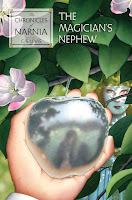
Lewis, C.S. 1955. The Magician's Nephew.
As long as folks don't erroneously place this one first in the series, I have no problems with this one at all. It's an interesting story of a young boy, Digory, and a young girl, Polly, and their adventures and misadventures in and out of this world, this reality.
"This is a story about something that happened long ago when your grandfather was a child. It is a very important story because it shows how all the comings and goings between our own world and the land of Narnia first began."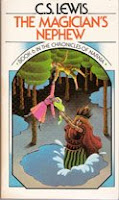 It assumes--presumes--a familiarity of sorts with Narnia, with Aslan, with the White Witch, with the Lamp Post, with the Wardrobe, with the Professor. (And it's just a bit silly to think this one should come first.)
It assumes--presumes--a familiarity of sorts with Narnia, with Aslan, with the White Witch, with the Lamp Post, with the Wardrobe, with the Professor. (And it's just a bit silly to think this one should come first.)
Digory, the young boy, grows up to be the Professor from The Lion, The Witch, and The Wardrobe. And this story is one of creation. How the world of Narnia came to be. How it was created. How evil was introduced into it. And how a promise of a savior was introduced as well. Hope. Promise. This one is rich in meaning.
The story for this one? Digory has a sick mother. Him and his mother are living with the Ketterleys. Mr. Ketterley is the boy's uncle. And he is mad, crazy, out-of-touch with reality, obsessed. He feels as the last person (in his reckoning at least)  who had a godmother with a touch of real fairy blood in her that he is destined for great things, great discoveries. His dreams are of being a powerful and great magician. He loves power; he uses it as a front to his own weakness both physical and mental. He's really an overgrown baby. Very fearful. Very immature. He tricks Polly so he can use her in an experiment, and then using Polly as incentive, he has Digory as a human guinea pig as well.
who had a godmother with a touch of real fairy blood in her that he is destined for great things, great discoveries. His dreams are of being a powerful and great magician. He loves power; he uses it as a front to his own weakness both physical and mental. He's really an overgrown baby. Very fearful. Very immature. He tricks Polly so he can use her in an experiment, and then using Polly as incentive, he has Digory as a human guinea pig as well.
Polly and Digory travel to another reality--several different realities--in fact. The book is full of their adventures and misadventures as they keep trying to set things right.
Aslan plays a big role in this one. And I love those scenes. I do.
© Becky Laney of Becky's Book Reviews
Blog: Becky's Book Reviews (Login to Add to MyJacketFlap)
JacketFlap tags: YA Fantasy, J Fantasy, international literature, Travel the World, "H" Titles, "L" Authors, Add a tag
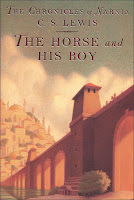
Lewis, C.S. 1954. The Horse and His Boy.
"This is the story of an adventure that happened in Narnia and Calormen and the lands between, in the Golden Age when Peter was High King in Narnia and his brother and his two sisters were King and Queens under him."
Our hero is a young boy named Shasta. He meets two talking horses, Bree and Hwin, and a young girl, Aravis. Together--all for various reasons--are traveling secretly to the North, to Narnia. Shasta, for example, is running away because his 'father' wants to sell him into slavery. Bree, o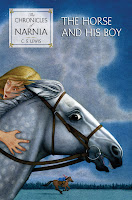 ne of the horses, is a talking horse that has been "owned" too long for his liking by a foreign soldier. He dreams of Narnia and of freedom. Aravis is running away from an arranged marriage. And Hwin, like Bree, is a horse Narnia-bound. Their journey isn't as easy and as smooth as they'd like. There are a few bumps along the way. Unexpected detours and delays. A few scares. A few close calls. Great danger that they always seem to be one step ahead of. But they soon discover that there is a purpose--strange as it seems to them--behind everything.
ne of the horses, is a talking horse that has been "owned" too long for his liking by a foreign soldier. He dreams of Narnia and of freedom. Aravis is running away from an arranged marriage. And Hwin, like Bree, is a horse Narnia-bound. Their journey isn't as easy and as smooth as they'd like. There are a few bumps along the way. Unexpected detours and delays. A few scares. A few close calls. Great danger that they always seem to be one step ahead of. But they soon discover that there is a purpose--strange as it seems to them--behind everything.
One of my favorite things about The Horse and His Boy is that it illustrates Romans 8. Aslan the lion is behind everything. Though silent and unrecognized, unacknowledged, he is traveling with these four on their way. And he has a plan and a purpose.
"Don't you think it was bad luck to meet so many lions?" said Shasta.
"There was only one lion," said the Voice.
"What on earth do you mean? I've just told you there were at least two the first night, and--"
"There was only one: but he was swift of foot."
"How do you know?"
"I was the lion." And as Shasta gaped with open mouth and said nothing, the Voice continued. "I was the lion who forced you to join with Aravis. I was the cat who comforted you among the houses of the dead. I was the lion who drove the jackals from you while you slept. I was the lion who gave the Horses the new strength of fear for the last mile so that you should reach King Lune in time. And I was the lion you donot remember who pushed the boat in which you lay, a child near death, so that it came to shore where a man sat, wakeful at midnight, to receive you."
"Then it was you who wounded Aravis?"
"It was I."
"But what for?"
"Child," said the Voice, "I am telling you your story, not hers. I tell no one any story but his own."
"Who are you?" asked Shasta.
"Myself," said the voice, very deep and low so that the earth shook: and again, "Myself", loud and clear and gay: and then the third time "Myself", whispered so softly you could hardly hear it, and yet it seemed to come from all round you as if the leaves rustled with it.
Shasta was no longer afraid that the Voice belonged to something that would eat him, nor that it was the voice of a ghost. But a new and different sort of trembling came over him. Yet he felt glad too. (281)
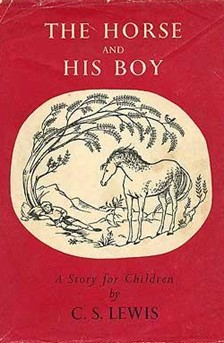 So perhaps if this one has a spiritual message it is one of God's providence and sovereignty.
So perhaps if this one has a spiritual message it is one of God's providence and sovereignty.As a child reader, I didn't get this one at all. I didn't get the theme. It wasn't an obvious one to me then. Not even as a teen. It was only in this past reading that I saw some inkling of a spiritual message within the pages. I thought, growing up, that it was a rather dinky story about horses. And I'm not really a horse-loving person. But this time I seem to see just a bit more.
© Becky Laney of Becky's Book Reviews
Blog: Becky's Book Reviews (Login to Add to MyJacketFlap)
JacketFlap tags: dystopia, YA Fiction, YA Historical Fiction, 2008, YA Science Fiction, "L" Authors, "I" Titles, Add a tag
Lowenstein, Sallie. 2008. In the Company of Whispers.
Weird. Weird. Weird. There is really no other way to describe this one. Weird doesn't equal bad. Not really. Especially not in this case. But it does mean different, very very different. That is unless you can name a list of novels that are part memoir and part science fiction that focus on Burma's troubled past in the 1950s and a Big-Brother type government of the 2040s. Certainly none came to my mind.
I'll try to give you an impression of what you'll find IN THE COMPANY OF WHISPERS. First, you'll find lots of quotes. These are drawn from the Burmese culture--history, mythology, etc. Second, you'll find lots of photos. Black and white photos. There is a list (an appendix perhaps?) of photo credits. That's something you don't find every day. Third, you'll find letters, personal letters, from 1958. These letters are based on those from the author's family from their time in Burma. Fourth, you'll find a fictional story of a family and society in turmoil. This is where the science fiction elements come more into play.
So it was interesting and fascinating in a way. But very strange and other-ly as well.
Three strange characters share this futuristic story--Zeyya, a teen girl, Granna, her grandmother, I think her name might be Louise but I'm not 100% sure, and Jonah, a tattooed stranger that appears on their doorstep soon after Zeyya's parents are "quarantined."
Another review: Wands and Worlds.
© Becky Laney of Becky's Book Reviews
Blog: Becky's Book Reviews (Login to Add to MyJacketFlap)
JacketFlap tags: YA Fiction, J Fiction, 2008, 2k8 Challenge, "L" Authors, "S" Titles, Add a tag

 Law, Ingrid. 2008. Savvy.
Law, Ingrid. 2008. Savvy.
Savvy is another book that had me at hello. "When my brother Fish turned thirteen, we moved to the deepest part of inland because of the hurricane and, of course, the fact that he'd caused it." Isn't that a great first sentence? Puzzling enough to hook you? I think so. A few pages later we read, "Monday through Wednesday, we called our thin stretch of land Kansaska. Thursday through Saturday, we called it Nebransas. On Sundays, since that was the Lord's Day, we called it nothing at all, out of respect for His creating our world without the lines already drawn on its face like all my grandpa's wrinkles." (4) So right from the beginning, the reader knows to expect the unexpected. Our narrator, a young girl named Mississippi (Mibs), has quite a way with words. She's fantastic. She's fun. And she's almost thirteen.
Mibs comes from a "special" family. Around the age of 13, every member of the family comes into their own on their thirteenth birthday. They discover their savvy, their special know-how power. For Fish, it was power of water--rain, thunder, winds, etc. For her brother Rocket it was electricity. Her mother's savvy is perfection. She can do things perfectly or mess up perfectly. Each member of her mother's side of the family is special like that--all unique, all special, all a bit weird.
Mibs is curious, super-super curious to get her savvy. Listen to this description of her waiting, "The itch and scritch of birthday buzz was about all I was feeling on the Thursday before the Friday before the Saturday I turned thirteen." But a few days before--the very day this passage was taken from the narrative--her birthday, her father is in a serious car accident. He's in a hospital almost 100 miles a way. While her mother goes to be with him, she leaves the kids--Rocket, Fish, Mibs, Samson, and Gypsy--at home.
Soon Mibs becomes convinced that her savvy will cure her father, will heal him, make him all better. But as you might imagine, savvy powers, don't quite work like that.
The novel focuses on her impromptu journey to visit her father--no matter what--and the lives she changes along the way on her special birthday weekend.
Definitely recommended.
© Becky Laney of Becky's Book Reviews
Blog: Becky's Book Reviews (Login to Add to MyJacketFlap)
JacketFlap tags: music, friendship, YA Fiction, brothers and/or sisters, dysfunctional families, 2008, YA realistic fiction, art appreciation, "L" Authors, "L" Titles, Add a tag

 Lurie, April. 2008. The Latent Powers of Dylan Fontaine.
Lurie, April. 2008. The Latent Powers of Dylan Fontaine.
Wow. Wow. Super-wow. You must read this book. I really really enjoyed April Lurie's first book, Brothers, Boyfriends, and Other Criminal Minds though it never did get the proper review since I reviewed it while I had the flu. (Here it is in its entirety: You'll just have to take my word for it that it is fabulous. Set in 1978, it is the story of one girl--her friends, her family, her neighborhood. It all works. It's just a good, good, thoroughly enjoyable book.) I didn't think it would be possible to love this next book even more. But I was wrong. Oh so wrong. I just loved and adored THE LATENT POWERS OF DYLAN FONTAINE.
I know I can't do it justice. It's one of those books that you'll just have to discover for yourself. But I can try. The writing, the characterization, everything is just so so so good. Dylan's narration of the novel is just oh-so-perfect. As a reader I just fell in love with him, his family, his friends. Dylan's life is far from perfect, far from ideal. He's going through a lot--and I do mean a lot--we first meet him in a jail cell. But it isn't what you think, not really. Yes, he stole two packages of Fruit-of-the-Loom underwear, but really...there's a good explanation for his crime.
Read for yourself all about Dylan in this wonderfully brilliant all-too-human coming-of-age novel.
Family. Friendship. Love. Life. The good. The bad. The ugly. Full of hope, full of wit, full of authentic and unforgettable characters. THE LATENT POWERS OF DYLAN FONTAINE has it all.
First sentence: I can tell you from experience that a jail cell is not a place you'd like to visit.
April Lurie's blog
April Lurie's web site
© Becky Laney of Becky's Book Reviews
Blog: Becky's Book Reviews (Login to Add to MyJacketFlap)
JacketFlap tags: J Historical Fiction, J Fiction, "L" Authors, "D" Titles, 2007, Add a tag
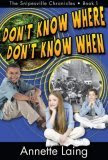
 Laing, Annette. 2007. Don't Know Where, Don't Know When.
Laing, Annette. 2007. Don't Know Where, Don't Know When.
We'll meet again, don't know where, don't know when, But I know we'll meet again, some sunny day. Keep smiling through, just like you always do, 'Til the blue skies drive the dark clouds far away.Don't Know Where, Don't Know When is the book that would have been perfect for the eight or nine year old me. It had everything I was looking for then: history, history, and time travel. Oh, and light mysteries to solve. How could I forget that little hook?! I've always always had a thing for time travel whether in tv shows, movies, or books. I've also always been fascinated with history. With learning the ins and outs of daily life in various time periods, in various locales. So this book so would have been right my speed at that age. That's not to say I don't have an appreciation for it now. But the degree has lessened to a certain extent. I enjoyed it now. I did. But I would have been crazy about it as a kid.
Set in three time periods, Don't Know Where, Don't Know When is the story of three children. Two of the children are brother and sister. The third child is a stranger whom the children meet just minutes before this exciting adventure begins. The siblings are Hannah and Alex Dias--though they later go by the names of Hannah and Alex Day. The third child is an African-American child named Brandon Clark. (Yes, race does play a role in this book.) He goes by several different names further along in the text--George Braithwaite, George Clark. The three meet seemingly by chance at the University library. They all three live in the (fictional) college town Snipesville, Georgia.
I mentioned three time periods. The first, the one in which we meet our narrators, is present day America. The other two time periods are a small town in England--Balesworth--both World War II and World War I. If it sounds confusing, don't worry. It flows smoother than it might at first appear. I promise.
These three children know very little about wartime Britain--but they're about to get an up, close, and personal tour of Britain during both World Wars, and the reader is along for the ride.
I won't say the book had me at hello. It didn't. I had to overcome my prejudice of the book cover. No offense is meant to whoever--or whomever--designed it. But it just doesn't say "read me, read me" for this particular reader. And it didn't have me hooked for the introduction and the prologue. However, by the second or third chapter, once the characters had mysteriously or magically time traveled back to 1940 England, I was one curious reader. And by the time Brandon/George vanished to time travel--on his own--to 1915 England, there was no doubt about it. I was liking it. The more I read, the more I wanted to read. So if you decide to pick up this one, please promise me to give it the fifty page test.
Don't Know Where, Don't Know When is an enjoyable treat of a novel. Proof that you NEVER should judge a book by the cover.
© Becky Laney of Becky's Book Reviews
Blog: Becky's Book Reviews (Login to Add to MyJacketFlap)
JacketFlap tags: J Fiction, "L" Authors, End of the World Challenge, "F" Titles, dystopia, 2007, YA Fiction, Add a tag
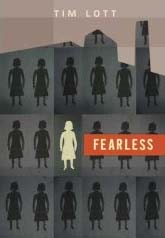
 Lott, Tim. 2007. Fearless.
Lott, Tim. 2007. Fearless.Prologue:
The girl could hear sobbing in the front room. Her mother was always crying about something or other, so the girl didn't take much notice. She just kept staring at the vidscreen in the corner of her bedroom. It was playing a vacation ad, all blue sea and white waves and sand like a field of honey. She wished she could just climb into the vidscreen and stretch out on the sand, dip her toes into the water, and never return. She would stay there and watch the world from the other side of the screen.Fearless or "Little Fearless" is just one of many girls imprisoned at the "City Community Faith School." There the girls have no name, no identity other than a letter and a number. The institution--be it prison or school or work camp--is composed of X's Y's and Z's. The X girls being ranked higher than the Z girls meaning they have higher privileges in a way but also higher responsibilities. They get to be "X" girls by doing the bidding of The Controller. In other words, they work for the enemy.
Then the knocking on the front door began. The girl thought that was odd, because they had a perfectly good doorbell. The knock seemed almost like a message. It went rap-rap-rappety-rap, as if it were a friend or a neighbor who always did their own special knock. But friends never came after dark, and the neighbors kept to themselves.
The girl heard a noise behind her. She turned and saw her mother. A dark birthmark the size of a fingernail and the shape of a star protruded from her hairline. Her cheeks were still damp from crying; her eyes were red and scrunched up like meat from a butcher's shop. She hadn't answered the door. Instead she lifted the girl up and pressed their faces together. The girl kissed her mother and tasted salt.. Her mother smiled, as if to tell her that everything was OK. Then she said she had some presents for her. The girl didn't understand. Her birthday was months away.
Her mother produced a small cloth bag and brought out three objects. The first was a picture of the girl's grandmother and grandfather, mounted in a bronze frame. Her grandfather wore a black suit with a cravat, and her grandmother wore a long pale dress and a floppy dark hat.
The second was a beautiful old silver watch with a fine leather strap that she said had once belonged to her father. She said she ought to have something to remind her that she did once have a father.
Finally she gave the girl once more thing: a golden locket containing a tiny photograph of her mother on her wedding day. She hung it gravely around the girl's neck. Then she put the framed photo and the watch back into the little cloth bag, handed it to the girl, and kissed her.
The knock on the door came again, louder this time. Rap-rap-rappety-rap. Her mother left the room. The girl heard the door catch being released, and then her mother began to shout. She heard a man's voice, stern and official sounding.
A few seconds later, a man wearing a uniform and a black peaked cap walked into the girl's room and, without a word, lifted her up. She could see her mother crying. The man didn't pause to let her say goodbye to her mother. He started to carry her down the stairs. The girl went limp. She felt unable to speak.
The door closed behind her. Then she heard her mother's voice through the thin panel of wood.
The locket. Read the words. Never forget the words on the locket.
In the harsh light of the street, the girl studied the back of the locket. She could just make out three lines of faint engraving. The girl pushed the locket inside her blouse and closed her eyes. She didn't resist as the man bundled her into the back of the ugly gray car with no side windows, started the engine, and drove away into the darkness. (3-5)
Fearless and her friends--Beauty, Soapdish, Tattle, and Stargazer--are in a hopeless situation. They all are. Imprisoned, worked to exhaustion, malnourished, unloved and mistreated, the girls are emotionally and physically starving. Fearless is popular--at least somewhat popular--among the girls because she tells stories of hope. She tells stories of the day when they'll all be free. Stories of the girls reuniting with family. Of the girls leaving for the outside world. Fantasies at this point as far as most girls are concerned but oh-how-good-it-sounds. Fearless and Stargazer believe, however, that their freedom will come. The day will arrive when someone will rescue them.
Fearless knows however that NO ONE can rescue them, will rescue them, unless they know the truth. She believes with all her heart and soul that the reason they're still there, still miserable, is that the public, the men and women of the city simply do not know the truth. The truth will set you free, right? If Fearless can escape to tell her story, help will come won't it? It has to, right?
This story is emotional and heartbreaking. Some might argue that it is more than a little predictable. But that might be a matter of age and experience of the reader, the more you've read the genre, the more familiar you are with the twists and turns one is likely to take. Others might think it's a bit too parablesque. More obvious than subtle. More a loud shout than a whisper. I agree in part. But I think that when it comes down to it you either believe or you don't believe. Little Fearless either touches you, resonates with you, or she doesn't. I believe that Fearless, the book not the character, can work for some readers. Not for every reader, but then again no book works for every reader. (For example, the plot twist where Fearless gathers the tears of every girl and captures them in a perfume bottle. And then later that perfume bottle is analyzed to reveal the exact number of tears. It's silly and requires you to suspend your disbelief long enough to go with the flow. And it's not the only plot element that requires this suspension of belief. If you care enough about Fearless, then you can go with the flow and overlook a few things that don't quite work.)
The book offers a way to look at life, at humanity. While it is not a perfect novel, for me at least, it worked well enough for me to lose myself in Fearless's world. While I read this book, followed her journey, I was hooked. Only time will tell if this one stays with me like The Giver and other such novels.
As dystopian fiction, it definitely portrays a world that would qualify for my "It's The End of the World As We Know It" challenge under the category of evil governments. It's not too late to join that challenge by the way. Here's a list of participants so far.
Other reviews: here, here, and here. Most reviews I found were skeptical at best and found more than a little to criticize. I think that might have influenced me to give the book the benefit of the doubt a little bit more than I might otherwise. I'm contrary like that.
© Becky Laney of Becky's Book Reviews
Blog: Becky's Book Reviews (Login to Add to MyJacketFlap)
JacketFlap tags: YA Fiction, prom, 2008, YA Romance, "L" Authors, "D" Titles, Add a tag
 Le Ny, Jeanine. 2008. Once Upon A Dream: Dress.
Le Ny, Jeanine. 2008. Once Upon A Dream: Dress.
This is the middle novel in the trilogy 'Once Upon A Prom' focusing on a trio of girls: Jordan, Tara, and Nisha. I don't know quite what to say honestly. It's incomplete at best. Meaning there is no resolution. This is the novel where everything falls apart, where conflicts are introduced one after another after another for all three narrators. The focus is still on proms, dating, and boys. And of course there is emphasis on friendship--how much can it withstand secrets and lies and betrayals (or supposed betrayals) and stress.
On its own, it's not much. With the other two, perhaps, there is something of value. I haven't read the third one yet. It somehow got separated from the first two--so it might take some digging through the boxes to find. So I'll let you know more when I've finished the series.
The good? For teens (younger teens especially) that love soap-opera type action--melodrama--then this series will probably be fun for you. It could work. But for young teens (12-14???) dreaming of high school days this could work.
© Becky Laney of Becky's Book Reviews
Blog: Becky's Book Reviews (Login to Add to MyJacketFlap)
JacketFlap tags: 2008, YA Romance, "L" Authors, "D" Titles, Add a tag
Le Ny, Jeanine. 2008. Once Upon A Prom: Dream.
 Depending on your expectations, you might just be surprised. Or not. I never know what to think about these original-as-paperback books. Especially when they seem to be gimmicky--tied to a theme like prom or cheerleading or summer romance. No offense. I mean plenty of people love to read about those types of things. The formulaic type approaches to those typical sorts of things. I just don't happen to be one of them. So my expectations were low. I expected average writing and average plot twists. I expected to be entertained certainly. What I found was a bit of substance. (Consider it the Snicker bars of junk food reading.)
Depending on your expectations, you might just be surprised. Or not. I never know what to think about these original-as-paperback books. Especially when they seem to be gimmicky--tied to a theme like prom or cheerleading or summer romance. No offense. I mean plenty of people love to read about those types of things. The formulaic type approaches to those typical sorts of things. I just don't happen to be one of them. So my expectations were low. I expected average writing and average plot twists. I expected to be entertained certainly. What I found was a bit of substance. (Consider it the Snicker bars of junk food reading.)
The characters have more depth than I was expecting. The novel focuses on three friends: Jordan, Nisha, and Tara. Tara, for some reason, seems to be the only character that isn't working for me personally. Jordan, the cheerleader, turns out to have more substance and a dilemma on her hands when she tries to go beyond her stereotype. Nisha is an Indian. (Yes, I mean from India). Her parents don't believe in dating, and they certainly DO NOT believe in their daughter dating a white boy. The fact that she is and is keeping it a big secret gives her some depth. I don't know if that's the right word. What I mean is that it makes her believable. Call me strange but Nisha is so far one of the big reasons I'm liking this series. It does ring as authentic. In college, my sister got immersed in the Indian circle on campus--most of her friends were Indian. I befriended a few of her friends, but certainly not to the same extent. So we got to know a few families quite well. So I know the debates, the conversations, the conflicts between the generations--on dating, on love, on marriage, on who is and isn't acceptable, on what 'the right age' for settling down is, the matchmaking, etc. And this book does seem to ring true from what I know.
The focus of the novel is on these three girls, their friendship, their relationships with guys, etc. It is the first of three books following these three girls. And as such, it doesn't really end...nothing is really resolved yet...so I'll be finishing up on the series. I'll probably reserve my final judgments for later on. But so far, I'm liking it. Liking doesn't mean loving or proclaiming it the most wonderfully philosophically deep reading in the universe. But it's fun. It's light. Definitely an appetizer and not a main course. But I think it's certainly enjoyable enough for teens if they like this sort of thing.
© Becky Laney of Becky's Book Reviews
Blog: Becky's Book Reviews (Login to Add to MyJacketFlap)
JacketFlap tags: J Fiction, J Fantasy, international literature, Travel the World, Inklings Challenge, "L" Authors, "V" Titles, Add a tag
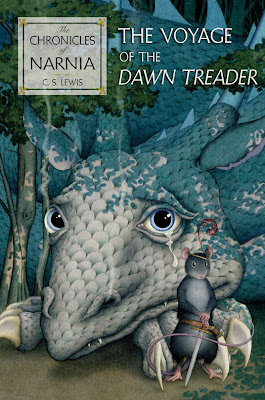
The Voyage of the Dawn Treader![]() by C.S. Lewis is the third novel in the seven-book series The Chronicles of Narnia. I loved both of these books--both Prince Caspian and The Lion, the Witch, and the Wardrobe. Loved. Yet I'm at a loss of words when it comes to the Voyage of the Dawn Treader. The Lion, the Witch, and The Wardrobe is the start of the magic. It is the first. It could arguably be the best. Prince Caspian has a charm all its own. It's consise; it's action-packed. It's thoroughly enjoyable. Yet The Voyage of the Dawn Treader--for me--has a certain magic all its own that I can't really explain. There are times when I feel it is my favorite. But at the same exact time I'm feeling that it's my favorite, I feel guilty for thinking that anything could be better than The Lion, the Witch, and The Wardrobe. I guess I feel I need permission to love another just as much--however differently--as I do my first love.
by C.S. Lewis is the third novel in the seven-book series The Chronicles of Narnia. I loved both of these books--both Prince Caspian and The Lion, the Witch, and the Wardrobe. Loved. Yet I'm at a loss of words when it comes to the Voyage of the Dawn Treader. The Lion, the Witch, and The Wardrobe is the start of the magic. It is the first. It could arguably be the best. Prince Caspian has a charm all its own. It's consise; it's action-packed. It's thoroughly enjoyable. Yet The Voyage of the Dawn Treader--for me--has a certain magic all its own that I can't really explain. There are times when I feel it is my favorite. But at the same exact time I'm feeling that it's my favorite, I feel guilty for thinking that anything could be better than The Lion, the Witch, and The Wardrobe. I guess I feel I need permission to love another just as much--however differently--as I do my first love.
This is a book that had me at hello. Say what you will about the first two books, neither have a first sentence that pops or sparks with magic. "There was a boy called Eustace Clarence Scrubb, and he almost deserved it." This sentence has to be one of my favorite, favorites of all time.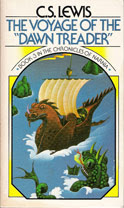 It goes on to say, "His parents called him Eustace Clarence and masters called him Scrubb. I can't tell you how friends spoke to him for he had none. He didn't call his Father and Mother "Father" and "Mother", but Harold and Alberta. They were very up-to-date and advanced people. They were vegetarians, non-smokers and tee-totallers, and wore a special kind of underclothes. In their house there was very little furniture and very few clothes on beds and the windows were always open."
It goes on to say, "His parents called him Eustace Clarence and masters called him Scrubb. I can't tell you how friends spoke to him for he had none. He didn't call his Father and Mother "Father" and "Mother", but Harold and Alberta. They were very up-to-date and advanced people. They were vegetarians, non-smokers and tee-totallers, and wore a special kind of underclothes. In their house there was very little furniture and very few clothes on beds and the windows were always open."
This is our first description of Eustace, "Eustace Clarence liked animals, especially beetles, if they were dead and pinned on a card. He liked books if they were books of information and had pictures of grain elevators or of fat foreign children doing exercises in modern schools."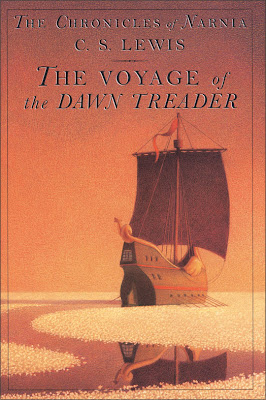 Can you tell already that The Voyage of the Dawn Treader is unique but uniquely wonderful? Eustace, as the reader soon learns, is the cousin of Peter, Susan, Edmund, and Lucy. And The Voyage of the Dawn Treader is the story of what happens when Lucy and Edmund go to visit their most unpleasant cousin. You'll find that magic follows the Pevensies wherever they go. This time the magic doesn't come from a wardrobe or the blowing of a magical horn. This time it's a painting--a portrait of a ship sailing the ocean that "calls" or "invites" the children to an unforgettable but dangerous thoroughly adventurous journey.
Can you tell already that The Voyage of the Dawn Treader is unique but uniquely wonderful? Eustace, as the reader soon learns, is the cousin of Peter, Susan, Edmund, and Lucy. And The Voyage of the Dawn Treader is the story of what happens when Lucy and Edmund go to visit their most unpleasant cousin. You'll find that magic follows the Pevensies wherever they go. This time the magic doesn't come from a wardrobe or the blowing of a magical horn. This time it's a painting--a portrait of a ship sailing the ocean that "calls" or "invites" the children to an unforgettable but dangerous thoroughly adventurous journey.
Edmund and Lucy--as you can imagine--are elated, thrilled, ever-so-happy to be back in Narnia. To be reunited with their good friend, Prince Caspian. But Eustace is miserable, cranky, mean, and downright unpleasant.
The dangers they face on their journey are unique. They're not like the dangers faced in The Lion, The Witch, and the Wardrobe or even the dangers faced in Prince Caspian. There are more dangers to be faced overall. But they're subtler. Quieter. The book has them sailing along on the seas, then occasionally stopping at various islands--some known, most unknown. Each chapter (though sometimes several chapters are related) has an adventure all its own. The novel is a handful of episodes, mini-adventures if you will. All of them unique. All of them memorable. Some episodes, I think I'll carry with me always. There's just something about this novel that just works for me.
© Becky Laney of Becky's Book Reviews
Blog: OUPblog (Login to Add to MyJacketFlap)
JacketFlap tags: Reference, Geography, A-Featured, Ben's Place of the Week, Island, greenland, warming, uunartoq, qeqertotoq—is, greenland’s, glaciers, islets, unpleasantly, Add a tag

Warming Island, Greenland
Coordinates: 71 33 N 1 47 W
Population: 0
Oftentimes surprises make us happy, and these unexpected events or discoveries provoke good feelings. Once in a while however, we are unpleasantly surprised and greeted with a sudden occurrence that comes more as a rude awakening. Greenland’s Warming Island—also known by the less-easily pronounced Uunartoq Qeqertotoq—is a recent geographical example of the latter. (more…)




The Australian cover is SO much better. I've wondered about the U.S. cover too, because is the fact that she's not black on the cover supposed to give us the clue that the whole book is a lie? Or is it not significant? Liz and I were talking about this book, and we came away with very different thoughts about what happened. And that's one of the things that I did like about it, that it made you question everything in reading it.
Authors have zero control over the cover. You really shouldn't read anything into it.
I actually really like the cover, but can see how it doesn't fit with the book. I wonder if that was intentional or just a mistake on the publisher's part. Sounds like an interesting read.
I think the cover is artistically beautiful. No question it is a compelling image. I'm not saying this cover is a "mistake" or "bad" in any way. It just leaves me with a question mark in a way.
I hope the cover has something to do with the theme of the book, because if not it just means it got white washed, and that sucks. :(
You kind of sold me on this one; I like books with narrators you probably don't want to be BFFs with. Will definitely check it out.
I've been up far to long, and I'm not sure my brain is working--am I missing something in the Australian cover? All I see is the Jello blobs (with some spelling liar), or are they supposed to be abstract body parts or something????
The way I've reconciled myself to the US cover art is that it's a lie (via the cover, Micah's first lie to us is what she looks like.) Otherwise it's one of the worse "make the main character look white even when she isn't" cover cases out there (there have been others).
Australian cover: I see it as blood, slowly revealing the truth: Liar.
I read Larbalestier's blog but can't remember if she's said anything about the U.S. cover. I haven't read the book yet -- don't have an ARC so I'll have to wait until September. It's an interesting premise for a book.
Here is a link to her discussion of the cover. She doesn't really say what she thinks about the fact that the girl on the cover and her description in the book don't match:
http://justinelarbalestier.com/blog/2009/04/10/the-usian-cover-of-liar/
A discussion like this on the cover is one of the very reasons I am enjoying the Challenge...it is my first book challenge and there are so many interesting angles to participation. Thank you for generating this particular discussion. I have finished my 48 hour period and am enjoying "cruisin'" the sites for longer periods than I allowed myself during the 48 hours. Thank you!
The Australian cover is kind of... meh... but I like the hair and eyes one. It may not betray the content of the book, so the cover is sort of true to the story. It's concealing a truth from the expectant reader =)
I love your blog by the way. I've never commented, but I just started my own book blog and I figured it was about the time.
This book looks interesting. I will have to keep it in mind. :)
Becky, I think the cover is artistically lovely too. It's a great cover but I don't like what it supposed to reveal or not reveal about the character. Or if it's just the worse depiction of a character in the book, like, ever.
Sounds like a great read. I, too, think it's really odd that the cover doesn't match the book, I wonder what the designers and publisher were thinking?